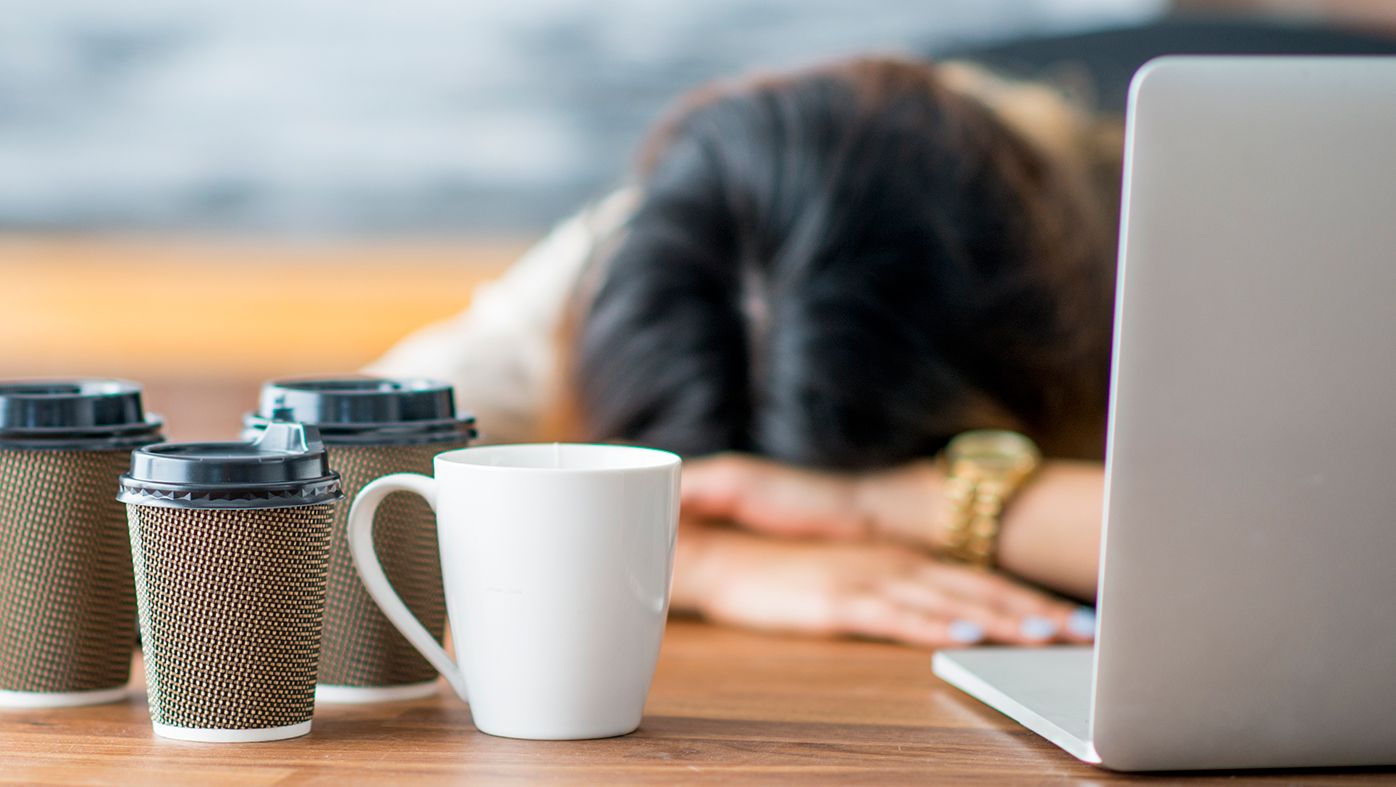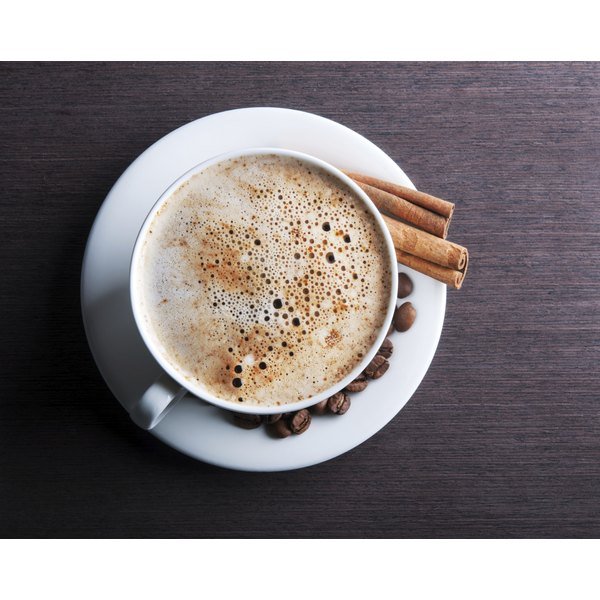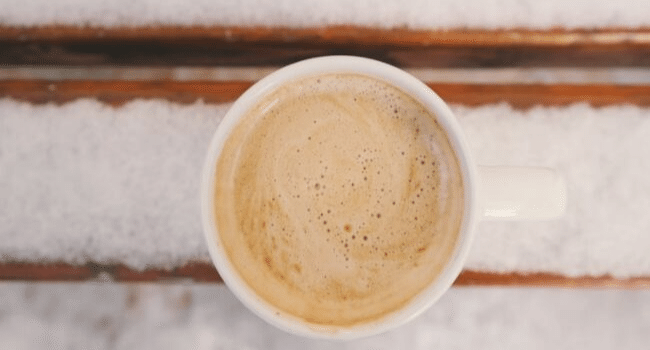How Long Does Caffeine Stay In Your System
Caffeine can stay in your system for up to 10 hours. After drinking caffeine, you may start to feel the effects in as little as 15 minutes, but typically peaking after around an hour. About six hours after initial consumption, half of the caffeine is still in your system, and it finally exits your system a full 10 hours later.
Caffeine Restricts Blood Flow To The Brain
When you are anxious, blood flow to the brain is already reduced and caffeine can reduce it further.
Caffeine restricts blood flow to the brain by as much as 27%.
Blood flow is the delivery system for getting nutrients of all kinds to your brain including oxygen, water, glucose, vitamins, and minerals.
An interesting aside is that many people take brain supplements and nootropics like ginkgo, citicoline, curcumin, and vinpocetine which work, in part, by increasing blood flow to the brain not realizing that the caffeine they drink essentially neutralizes this benefit!
How Much Caffeine Is Safe To Drink
Since caffeine can be both beneficial and harmful depending on the dose, it is important to find a level of consumption that is healthy for you. The Food and Drug Administration recommendation for safe daily caffeine consumption sits around 400mg, or 4-5 cups of coffee per day. A large cup of coffee can have up to 470 mg of caffeine content which is more than the daily recommended caffeine content. It is essential to read the fine print about what youre drinking. Since there can be a lot of variation in the way people respond to and metabolize caffeine, talk to your doctor if you are unsure if your caffeine consumption is recommended.
Recommended Reading: Pristiq Side Effects
Caffeine And Anxiety Make You Feel Jittery And Nervous
Caffeine is a stimulant and that can be bad news for someone with anxiety. Caffeine’s jittery effects on your body are similar to those of a frightening event. That’s because caffeine stimulates your fight or flight response, and research has shown that this can make anxiety worse and can even trigger an anxiety attack.
Other research suggests that while caffeine can increase alertness, attention, and cognitive function, overdoing it can increase anxiety, particularly in people with panic disorder and social anxiety disorder. And as with the symptoms of anxiety, one too many cups of joe may leave you feeling nervous and moody, and can keep you up at night.
Reasons Why Coffee May Be Causing You Anxiety

More than 18% of adults 18 years or older suffer from some form of anxiety every day. There are many different reasons that people experience anxiety and that can make identifying the real cause difficult to diagnose. Effective treatments for anxiety do exist and in many cases, simple lifestyle changes can help. One common contributor to anxiety in adults is our daily cup of coffee reducing the amount of coffee we drink each day can help to reduce anxiety. Here are the reasons why coffee may be causing your anxiety.
Don’t Miss: Is Pristiq A Good Antidepressant
Caffeine Robs You Of Essential Brain Nutrients
Caffeine causes nutrients to be excreted from your body, some of which are particularly important for your brain health and mood.
One of the nutrients that gets depleted is magnesium, a mineral that has profound effects on your mental wellness.
Magnesium plays a critical role in a number of brain-related disorders including:
- addictions
Anxiety is a common sign of B vitamin deficiency.
Taking extra B vitamins can address imbalances of the brain chemicals GABA, serotonin, dopamine, and epinephrine that contribute to anxiety.
Medications Can Trigger An Anxiety Attack
Certain medications have some ugly side effects and can cause anxiety symptoms or an anxiety attack. Prescription medications to watch out for include thyroid drugs and asthma drugs, while over-the-counter decongestants have been known to cause anxiety symptoms in some people. If you suddenly stop taking certain medications sometimes used to treat anxiety, such as benzodiazepines, withdrawal may cause added anxiety.
Also Check: Late-onset Schizophrenia
Anxiety Disorders Are Linked To Alcohol And Drugs
There is a strong link between alcohol and anxiety. Research shows that people with anxiety disorders are two to three times more likely to have problems with drugs and alcohol at some point in their lives than the general population. But that’s not all: Alcohol and drugs can often cause panic attacks, according to the Anxiety and Depression Association of America .
People with social anxiety, in particular, may turn to alcohol in order to lessen their symptoms, but alcohol can actually make anxiety worse. About 20 percent of people with social anxiety disorder also have an alcohol or substance abuse disorder, notes the ADAA. No matter which problem comes first, the combination of drugs, alcohol, and anxiety can become a vicious cycle.
Potential Benefits Of Coffee/caffeine On Anxiety
It’s important to note that we are talking about those with generalized anxiety or daily anxiety not necessarily those with other anxiety disorders .
We’re also talking about only one to four cups of coffee or tea per day, with no added ingredients. Many people add sugars, creamers, and other ingredients to their caffeinated drinks, and these may cause their own issues. We are focusing 400 milligrams of caffeine, or less, in black coffee or green tea.
With those parameters in place, there is reason to believe that caffeine has no negative effect on anxiety, and may actually be beneficial for those that have mild to moderate general anxiousness.
Several studies examined the relationship between caffeine and anxiety. They found that there were interesting changes to the body that occurred when people with anxiety consumed caffeine. For example, those with anxiety may not need as much caffeine to experience the same effects. But, the research also showed that anxiety scores were no different between those that consumed caffeine and those that did not.
Few studies appear to confirm the theory that caffeine has a negative effect on anxiety.
An interesting summary of the possible benefits of caffeine consumption was published by the New York Times. They showed several of the known benefits of caffeine, including:
Research has shown that there are also other potential benefits, such as drinking coffee socially , lowering the risk of developing Type II diabetes, and more.
You May Like: What Is A Phobia Of Spoons Called
How To Reduce Your Caffeine Intake
Since caffeine is an addictive substance, it is best to taper your intake down gradually. If you are a coffee drinker, you may switch to half-caf, then decaf. You could also drink tea instead of coffee, moving from black tea to green tea or non-caffeinated herbal teas. If you drink energy drinks, reduce the number of drinks you consume per day until you have phased them out of your diet completely.
You may experience some withdrawal symptoms at each stage of the process. This may include headaches, grogginess, shakiness, or fatigue. These symptoms will pass as your body gets used to having less caffeine, and your natural energy levels will start to rise again. Drink plenty of water along the way to keep your body hydrated and flush toxins from your system.
Caffeine Increases Stress Hormones
Most people who deal with anxiety would agree that they have too much stress in their lives and caffeine adds to the burden.
Caffeine affects the body much like stress by increasing heart rate, blood pressure, and levels of stress hormones.
” Some psychiatrists recommend that routine psychiatric assessments should include examining caffeine consumption since removing caffeine can be more beneficial than prescribing anti-anxiety drugs.
Caffeine consumption can more than double the blood levels of the stress hormones cortisol and epinephrine.
Read Also: Which Of The Following Represents A Negative Symptom Of Schizophrenia
How Long Does Caffeine Last
The effects of caffeine are measured by its half-life, which typically ranges from 4-6 hours. The half-life means the time that your body has metabolized, or processed through, half the caffeine you consumed. As a result, the six-hour half-life of a caffeinated beverage you consume in the afternoon could keep you up at night.
Some factors can slow or speed up the metabolism of caffeine. Nicotine use can reduce the half-life of caffeine by up to 50%, so frequent smokers process through caffeine much quicker, with a half-life as short as two hours. By contrast, pregnant women experience slower caffeine metabolism. It is recommended that those who are pregnant or breastfeeding should avoid coffee, or limit intake to 16 ounces or less per day .
During pregnancy, caffeine can be passed to the baby through the placenta. A trace amount of caffeine can also be found in breast milk. If you are pregnant or breastfeeding and concerned about your caffeine intake, talk to your health care provider about what steps you should take to ensure optimum health for you and your baby.
Can Caffeine Keep Me Awake

Caffeine can cause a burst of energy as it stimulates the central nervous system . Most people drink coffee in the morning to help them wake up, but caffeine consumed at night can cause more harm than good. While caffeine can boost cognitive function in the severely fatigued, it cannot permanently ward off sleep or fix the effects of long-term sleep loss. Even though caffeine can marginally boost performance, it is no substitute for a restful, restorative night of sleep.
It is also proposed that the effectiveness of caffeine varies depending on the dose and the state of the individual. For example, the arousing effects of caffeine may benefit someone who feels foggy and tired. For someone who is already alert and aroused, however, caffeine may cause over-arousal and lead to anxiety, restlessness, and dependency.
You May Like: Pristiq For Ocd
The Caffeine Crash: Why Does Coffee Make Me Sleepy
After settling down with your morning cup of joe, you expect the caffeine to hit relatively quickly, but sometimes you may end up with more of a caffeine crash than a rush. So, for a drink thats known for its ability to wake you up, why does coffee make you tired?
If coffee makes you sleepy, theres likely a root cause behind it. While the caffeine in coffee works by blocking adenosine receptors in your brain, caffeine can sometimes kick back harder than intended. Other times, additions like dairy and sugar may be the real culprits making you tired.
Keep reading to learn more about why coffee makes you sleepy, and why getting a better nights sleep can help minimize the side effects that come along with a caffeine crash.
What Is The Difference Between Fear And Anxiety
Anxiety differs from fear in several important ways. Fear is a response to present danger it is usually highly focused, attached to a very specific thing or circumstance, and meant to mobilize fast action. Anxiety doesnt require an external stimulus it is a response to real or imagined future threat, and it is typically more diffuse, setting in motion the need for constant vigilance in anticipation of some calamity. Fear is contagious, marked by characteristic featureswidened pupils, pale skin that signal others to be afraid. Anxiety is highly subjective. While anxiety shares some of the physiological signs of fearheightened awareness and fast heart rate, similarly set off by the hormones of the stress responseit carries a heavy cognitive load of worry, a form of rumination about what might possibly go wrong in the future.
Also Check: Does Diabetes Cause Anxiety
Does Caffeine Make Some People Sleepy
Yes. It may seem counterintuitive, but some people feel like caffeine makes them tired instead of more alert. The disruptive effects of regular caffeine use on sleep can create a vicious cycle. Caffeine use causes sleep deprivation, and sleep deprivation causes sleepiness the subsequent day, which in turn causes an increased need to consume more caffeine in order to cope with the sleepiness. Even with increased caffeine consumption, sleep deprivation catches up. People may be especially aware of their long-term sleep loss after they consume caffeine because they do not experience the pick-me-up they expected, and instead feel sleepy.
Sleepiness can also be a symptom of abstinence from caffeine, which is why regular caffeine users may feel overly sleepy in the morning when they have gone all night without caffeine.
Does Coffee Cause Anxiety Hours Later
As we all know that coffee contains caffeine. This substance that is present in most types of coffee has the ability to boost alertness. Once its drunk, caffeine works by blocking adenosine effects. This is a chemical in our brain that triggers the tired feeling.
At the same time, this substance also works in our body by releasing adrenaline, a certain hormone that is called fight or flight and that is associated with boosted energy.
Nevertheless, the role of caffeine in our body does vary depending on its dose taken by us. The higher the dose means the bigger the effects of the caffeine on our body. If caffeine is consumed at a high dose, the effects can be more pronounced, causing nervousness and also anxiety.
This effect of caffeine has been researched by the American Psychiatric Association. In their DSM or Diagnostic and Statistical Manual of Mental Disorders, it is said that anxiety disorder induced by caffeine is categorized as one of the four syndromes related to caffeine.
Anxiety is a response of our body to the situations perceived as threatening or worrisome. It then promotes and triggers the response of fight or flight from your body. As the result, caffeine makes you overreact to those situations that are not actually troublesome or dangerous.
Also Check: What Does The Suffix Phobia Mean
Can Coffee Trigger Anxiety Attacks
Caffeine is a stimulant and that can be bad news for someone with anxiety. Caffeines jittery effects on your body are similar to those of a frightening event. Thats because caffeine stimulates your fight or flight response, and studies show that this can make anxiety worse and can even trigger an anxiety attack.
What Did The Data Say
My average Mood score improved by 20% and I was more likely to report feeling good or relaxed. Although I was also more likely to report being grumpy.
My average Symptom score this is the score from across all the symptoms I track, not just anxiety dropped by 55%.
My Sleep Quality remained the same as before the experiment which was a surprise to me but my Sleep Quantity improved by more than 10%.
Don’t Miss: Does Pristiq Help With Anxiety
What Biological Factors Influence Anxiety
The state of a persons health, past or present, plays a large role in triggering anxiety. Those with chronic conditions such as diabetes or heart disease are at risk of constant worry about getting sick or sudden death. In fact, having a heart attack is known to raise the risk of health anxiety by 20 to 30 percent. People with breathing problems such as asthma or who have severe allergies to common substances may live with chronic worry about exposure to triggering substances. Some people are highly sensitive to internal body sensationsinteroceptionand may devote so much mental energy to monitoring, say, their heartbeats that every variation becomes a source of doubt and concern. A large number of peoplein some estimates, as many as 20 percent of the populationare said to be highly sensitive having a low threshold of nervous system arousal, they overrespond to both internal and external stimuli and can be easily overwhelmed emotionally. Their reactivity is linked to the personality trait of neuroticism, one of the strongest risk factors for anxiety.
Caffeines Role In Our Society

Caffeine is being offered to us in a variety of ways. There is a coffee shop on every corner and a convenience store on the other corner. They are selling us what we need, energy. We put less gas in or cars so we can buy two monster drinks loaded with triple shots of caffeine. We get the double espresso for our drive to work and the ginseng green tea with extra zest to sip on throughout the day. We spend between five and ten dollars a day on our caffeine cravings. Could we make our own at home and take it with us in a thermos? Sure. But only a few do this and come on lets face it, they are kind of nerdy. Why? Because people in our society like to be seen holding the Starbucks coffee cup, not the bobo cup we got from our cabinet. And it is even cooler to have the refillable cup, making the statement that we are there so often we earned ourselves a refill cup. Guess what? We all fall into this trap. Just this year American independent coffee shops equaled 12 billion in sales.
Recommended Reading: What Is The Phobia Of Clowns Called
What Does Caffeine Do
Caffeine can help you feel alert and focused. But it also can cause anxiety, stomach upset, headaches, and the jitters. Caffeine can make it hard to sleep. How someone reacts to caffeine depends on a persons age, weight, gender, and caffeine sensitivity.
Caffeine sensitivity is the amount of caffeine that will cause symptoms. This varies from person to person. But people who regularly have a lot of caffeine become less sensitive to it. This means they need more caffeine to get the same effects.
Caffeine increases heart rate, blood pressure, and stress hormones. People with some medical conditions should avoid caffeine. Talk to you doctor about your caffeine consumption if you have high blood pressure or heart problems, are taking medicines or over-the-counter supplements, or are dealing with stress or anxiety.